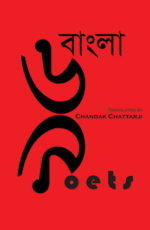| Author | |
|---|---|
| Imprint | |
| Language | |
| Edition | |
| Publication Year | 2012 |
| Binding | |
| Pages | 120 |
Absent Muses
$10
About the Book
Cities So tell me. Is it hot? Does it rain? Are there places you can sit on a sunny day, away from the crowd? Is it beautiful? Is it loud? What do the streets smell like? What do the women wear? Are they pretty? Do you love it? Could you leave?
Related products
-
Says Tuka-Selected poems of Tukaram
$30About the Book
Tukaram was born in 1608 and vanished without a trace in 1650. what little we know of his life is a reconstruction from his own autobiographical poems, the contemporary poetess Bahinabai’s memoirs in verse, and the later biographer of Marathi poet-saints, Mahipati’s account. The rest is all folklore, though it cannot be dismissed on those grounds alone. Modern scholars such as the late V. S. Bendre have made arduous efforts to collate evidence from disparate contemporary sources to establish a well-researched biography of Tukaram. But even this is largely conjectural.
Tukaram is therefore not only the last great Bhakti poet in Marathi but he is also the first truly modern Marathi poet in terms of temper and thematic choice, technique and vision. He is certainly the most vital link between medieval and modern Marathi poetry. Tukaram’s stature in Marathi literature is comparable to that of Shakespeare in English or Goethe in German. He could be called the quintessential Marathi poet reflecting the genius of the language as well as its characteristic literary culture. There is no other Marathi writer who has so deeply and widely influenced Marathi literary culture since. Tukaram’s poetry has shaped the Marathi language, as it is spoken by 70 million people today and not just the literary language. Perhaps one should compare his influence with that of the King James version of the Bible upon speakers of the English language. For Tukaram’s poetry is also used by illiterate millions to voice their prayers or to express their love of God.
-
The Metaphysics of the Tree-Frog’s Silence
$12About the Book
It is our loss that we did not know Ajithan Kurup’s work when he was alive, and we did not celebrate his brave and lonely project: to render the unsayable into language. He cannot be imitated or replaced, only admired.- Jeet Thayil
To enter Ajithan G. Kurup’s poetic world is to risk, in the words of his title poem, dancing “headlong down precipices.” It’s rare to find a contemporary poet who dares near-unattainable heights and fearful depths on dancing words – words that may sometimes seem far-fetched or invented but which, in fact, are inspired variants or archaic forms of those more usually used: “sempstress” instead of “seamstress”, “enow” instead of “enough”, “trode” instead of “trod”.-ADIL JUSSAWALLA
-
Last-Ditch Ecstasy
$14About the Book
Adrian Grima in collaboration with his talented and unusually resourceful translator, Albert Gatt – has produced a rich and memorable compilation of poems. Their geographical and emotional stew is international in its flavours yet always Maltese in its complex marinations. Grima succeeds in being – and these are potent combinations – both lyrical and true-to-life, both tender and unblinking, both comforting and challenging. His collection is a thought-provoking joy.- Jim Crace
How can the soul survive the world’s brutality. This is the essential, unanswerable question that Adrian Grima asks in and through his poems, beautifully translated from the Maltese by Albert Gatt. Taut with unexpected collusions, the poems walk the tightrope tensions of time and space. Turmoil, both emotional and political, is contained within the ascetic rigour of the lines; the mysteries of the distant are brought closer through eyes and lips, taste and touch. In Grima’s world, a lull can be as keen as a knife, blood can be the ultimate betrayal. An arterial anxiety courses through his work. Between “thistle and sun”, between skin and skin, between “departure and return”, the poet repeatedly alerts us to the heart-breaking fragility of the body, besieged. Coexistent with his bruising awareness of damage is his faith in contact, in simple human pleasures, a conversation, a pot of flowers, a meal. Deeply intelligent and moving, here is a book with “sky in its wings, migration in its heart”. Read it, be shattered, then soar.- Sampurna Chattarji
-
40 under 40
$5About the Book
“The Indian poetry scene has always been considered to be lively, but no better evidence of this fact exists than 40/40. Here we have forty contemporary Indian poets under forty years old, and what we encounter is extraordinarily timely and compelling, providing us the trace of a newly emergent lyric consciousness, simultaneously local and cosmopolitan. Here we have Akhil Katyal reminiscing about being ten years old and growing up in the shadow of the AIDS epidemic, “battling the stars of a virus”; we have Chandramohan S’ witty “Plus-Size Poem” that “does not opt for offshore liposuction”; and we have the speaker of Ishita Basu Mallik’s sonnenizio about going commando under her jeans and turning her beloved into ” an electric remnant bombarding” her “bones with wavelengths.” From Jennifer Robertson’s prose poem about Jesus and Jaipur, Rohan Chhetri’s universe in braille, or Shelly Bhoil’s typographical experimentation, this anthology shows us the pulse of a generation coming of age in an era of mass media and Hindu mythology. I have no doubt that this will be one of those books that when looked back on will have been proven to be seminal and indispensable, introducing us to both the present and the future of Indian poetry.” -Ravi Shankar, Pushcart Prize winning poet and Founding Editor of Drunken Boat * THIS ANTHOLOGY HAS BEEN EDITED BY NABINA DAS & SEMEEN ALI









